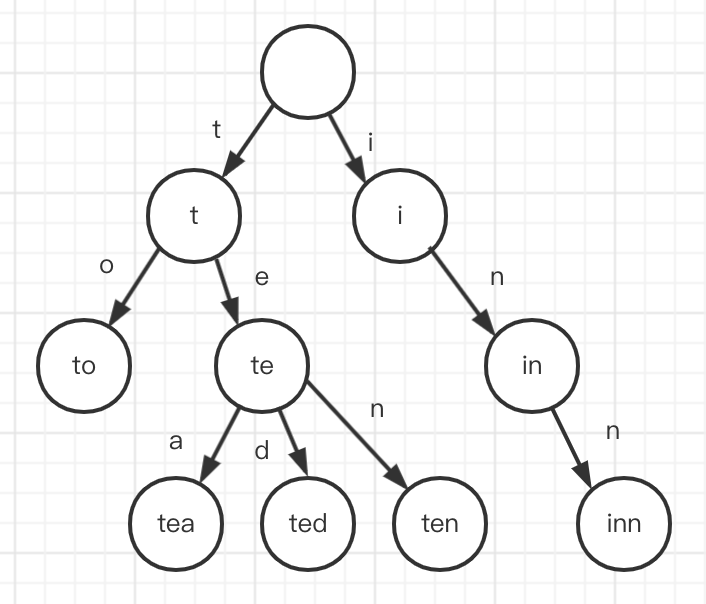数据结构之字典树实现(TypeScript版)
哈希表实现见前文 数据结构之哈希表(散列)实现
1. 介绍
在计算机科学中, 字典树(trie,中文又被称为“单词查找树”或“键树”),也称为前缀树(因为它们可以通过前缀搜索),它是一种搜索树——一种已排序的数据结构,通常用于存储动态集或键为字符串的关联数组。
值对于字典树中关联的节点来说,不是必需的,相反,值往往和相关的叶子相关,以及与一些键相关的内部节点相关。

2. 实现
2.1 节点
ts
// trie/TrieNode.ts
import HashTable from '../hash-table/HashTable';
export default class TrieNode {
public character: string;
public isCompleteWord: boolean;
private children: HashTable;
constructor(character: string, isCompleteWord = false) {
this.character = character;
this.isCompleteWord = isCompleteWord;
this.children = new HashTable();
}
// 获取孩子节点
getChild(character: string) {
return this.children.get(character);
}
// 增加孩子节点,返回增加的节点
addChild(character: string, isCompleteWord = false): TrieNode {
if (!this.children.has(character)) {
this.children.set(character, new TrieNode(character, isCompleteWord));
}
const childNode = this.children.get(character);
// In cases similar to adding "car" after "carpet" we need to mark "r" character as complete.
childNode.isCompleteWord = childNode.isCompleteWord || isCompleteWord;
return childNode;
}
// 删除孩子节点
removeChild(character: string) {
const childNode = this.getChild(character);
// Delete childNode only if:
// - childNode has NO children,
// - childNode.isCompleteWord === false.
if (childNode && !childNode.isCompleteWord && !childNode.hasChildren()) {
this.children.delete(character);
}
return this;
}
// 是否有指定孩子节点
hasChild(character: string) {
return this.children.has(character);
}
/**
* Check whether current TrieNode has children or not.
*/
hasChildren() {
return this.children.getKeys().length !== 0;
}
// 展示孩子节点
suggestChildren() {
return [...this.children.getKeys()];
}
toString() {
let childrenAsString = this.suggestChildren().toString();
childrenAsString = childrenAsString ? `:${childrenAsString}` : '';
const isCompleteString = this.isCompleteWord ? '*' : '';
return `${this.character}${isCompleteString}${childrenAsString}`;
}
}2.2 树
ts
// trie/Trie.ts
import TrieNode from './TrieNode';
// Character that we will use for trie tree root.
const HEAD_CHARACTER = '*';
export default class Trie {
public head: TrieNode;
constructor() {
this.head = new TrieNode(HEAD_CHARACTER);
}
// 增加单词
addWord(word: string) {
const characters = Array.from(word);
let currentNode = this.head;
for (let charIndex = 0; charIndex < characters.length; charIndex += 1) {
const isComplete = charIndex === characters.length - 1;
currentNode = currentNode.addChild(characters[charIndex], isComplete);
}
return this;
}
// 删除单词
deleteWord(word: string) {
const depthFirstDelete = (currentNode: TrieNode, charIndex = 0) => {
if (charIndex >= word.length) {
// Return if we're trying to delete the character that is out of word's scope.
return;
}
const character = word[charIndex];
const nextNode = currentNode.getChild(character);
if (nextNode == null) {
// Return if we're trying to delete a word that has not been added to the Trie.
return;
}
// Go deeper.
depthFirstDelete(nextNode, charIndex + 1);
// Since we're going to delete a word let's un-mark its last character isCompleteWord flag.
if (charIndex === word.length - 1) {
nextNode.isCompleteWord = false;
}
// childNode is deleted only if:
// - childNode has NO children
// - childNode.isCompleteWord === false
currentNode.removeChild(character);
};
// Start depth-first deletion from the head node.
depthFirstDelete(this.head);
return this;
}
// 根据单词前缀展示后面的子节点
suggestNextCharacters(word: string) {
const lastCharacter = this.getLastCharacterNode(word);
if (!lastCharacter) {
return null;
}
return lastCharacter.suggestChildren();
}
/**
* Check if complete word exists in Trie.
*/
doesWordExist(word: string) {
const lastCharacter = this.getLastCharacterNode(word);
return !!lastCharacter && lastCharacter.isCompleteWord;
}
// 根据单词前缀获取最后一个字符对应的节点
getLastCharacterNode(word: string) {
const characters = Array.from(word);
let currentNode = this.head;
for (let charIndex = 0; charIndex < characters.length; charIndex += 1) {
if (!currentNode.hasChild(characters[charIndex])) {
return null;
}
currentNode = currentNode.getChild(characters[charIndex]);
}
return currentNode;
}
}